Why Is My Car AC Compressor Cycling On and Off Every 5 Seconds? (6 Causes)
Insufficient and excessive refrigerant pressure in the car AC system are the most possible causes of compressor cycling on and off every 5 seconds. If the pressure is too low or high, the compressor cycles intermittently to maintain optimal pressure. A pressure gauge can confirm if it’s at the right level. Ensure that AC pressure switches, expansion valve, compressor clutch, condenser, and evaporator are functioning well. Engine overheating can also cause short cycling of AC compressor, so check for that too.
The air conditioner turning on and off again and again can make your car very hot. This issue of the AC compressor short cycling a lot can bother you. Let’s talk about why this happens often. Knowing the common reasons can help find the fault. Then you can fix it yourself.
If you have a preliminary knowledge of AC compressor and clutch components, you can jump straight to the potential causes section.
I’ve created an interactive tool for you to assist in diagnosing car issues. It directs you through simple steps. Make sure to look into it.
- Insufficient refrigerant pressure is the most common reason for AC compressor cycling every 5 seconds. Use a pressure gauge to confirm.
- An overpressurized AC system can also cause short cycling. Check for clogged components or overcharged refrigerant.
- Faulty AC pressure switches give false readings, turning compressor on/off. Test with multimeter.
- Engine overheating indirectly causes cycling by heating cooled air. Check cooling system.
- Compressor clutch slipping from high pressure, lack of lubrication, oil on plate, loose belt, or increased air gap causes cycling.
- Bad electrical connection to compressor clutch coil can cause intermittent cycling. Check wiring and coil resistance.
What is My Personal Experience With Car AC Compressor Cycling On and Off Issue?
Once my uncle’s Honda Civic’s AC started blowing hot air. The compressor was cycling on/off repeatedly. Using gauges, I found the refrigerant pressure was too low. Tracing the system with a UV light revealed a small leak in an AC hose.
I replaced the worn hose, recharged the refrigerant to the proper level and the AC worked great again all season
How Does Car AC Compressor Work?
The car’s AC compressor works its magic by squeezing the refrigerant gas in the AC system. This refrigerant is typically a mix of Freon and oil. The oil gets blended with the Freon by the manufacturer to grease up the compressor when it flows through.
The AC compressor pulley connects to the serpentine belt. It spins the piston in the compressor when the clutch embraces the pulley. The piston squeezes the refrigerant gas, upping the pressure and temperature.
The serpentine belt hooks up to the engine to run the AC system. It’s a single belt that stretches across all the pulleys in the motor.
The compressor pulley mechanically joins with the engine. So it’s always whirling when you fire up the engine since the crankshaft is also spinning. The AC compressor only engages when the electromagnetic clutch plate grips the compressor pulley. This happens when current flows through the compressor clutch’s electromagnetic coil.
You can look at the AC compressor pulley in the image below. It has slots that allow the magnetic field from the compressor clutch coil to pass through and yank the compressor clutch plate inward.
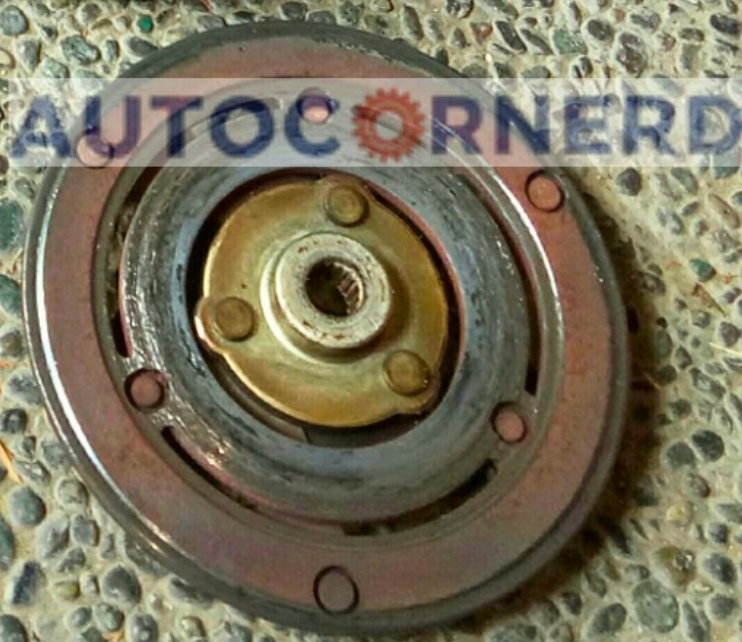
The compressor clutch plate (shown below) has springs, a hub, and a friction plate. The hub connects to the AC compressor shaft.
When the friction plate of the compressor clutch meshes with the pulley, the pulley’s rotation gets transferred to the compressor through that hub. The springs link the hub to the friction plate and directly mate with the pulley’s friction surface.
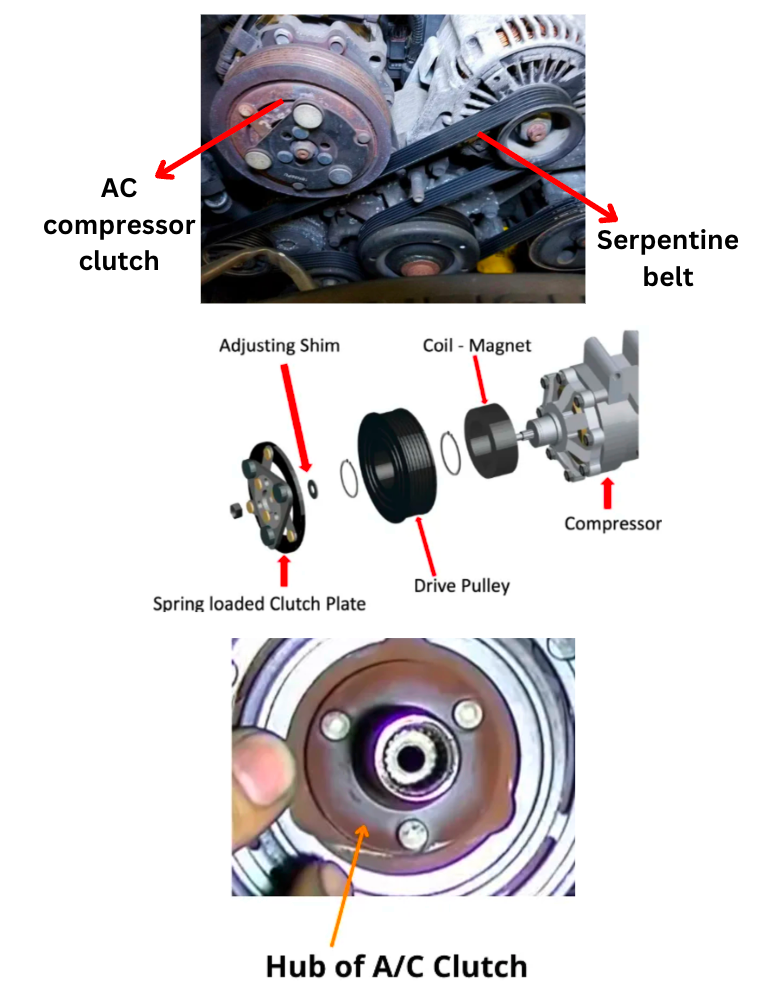
I’m also attaching a short Youtube video in which there is a demonstration of the working of a car AC compressor:
Bonus Read: Car sputtering and shaking when AC is on
What Are The Causes Of AC Compressor Cycling On And Off?
Here are the causes of AC compressor cycles on and off every few seconds:
1. Low Refrigerant Charge Due To Leakage
The car’s AC system uses refrigerant to produce cool air. This refrigerant circulates in a closed loop under pressure. The compressor pressurizes the refrigerant to pump it through the system.
If there is a leak, the refrigerant charge drops. This causes the low-side pressure to fall below what the compressor needs. The low side is the part between the evaporator outlet and compressor inlet. It’s also called the compressor’s suction pressure.
With too little refrigerant, the compressor cycles on and off trying to maintain the pressure balance. The refrigerant lubricates the compressor too. So low refrigerant increases wear and tear.
Normally, the low side pressure should be 25-40 psi. This is with the engine running and AC on. Raising engine RPMs lowers the low side pressure. It increases the discharge pressure at the compressor outlet.
The refrigerant must stay pressurized in the closed loop. If leaked out, the low charge makes the low side pressure drop. This disrupts the compressor and pressures. Proper refrigerant levels keep the AC system running smoothly.
How to spot?
To spot low refrigerant charge in the car AC system, you should check low-side pressure using the pressure gauge kit with the engine running.
The leaks in the car AC system can happen due to:
- Faulty seal of condenser, evaporator, and compressor
- Damaged O-rings
- Worn-out hose
You can recharge the A/C system with a refrigerant that has a dye in it so you can trace all the hoses and connections when the system leaks down again using UV light. You can also pressurize car AC system with air and spot refrigerant leaks using soapy water.
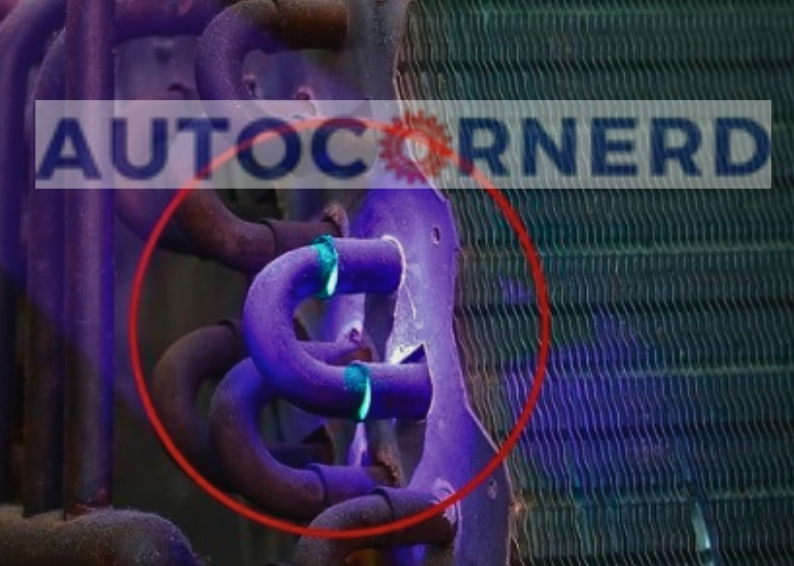
Moreover, if evaporator coils are icy, it also indicates low refrigerant levels. This is because when the pressure drops inside evaporator coils due to low refrigerant, the moisture in the air accumulates and freezes on the evaporator coils. This is the basic Physics principle. If the pressure is lower, the freezing point of water increases.
2. Overpressurized Car AC System Due To Blockage
The first thing for checking if car’s AC cycles on and off each 5 seconds is the high-side pressure. If high-side pressure becomes very high, it can make short cycling of the compressor.
When AC compressor gets too much pressure, it has to work harder for keeping refrigerant moving, and makes compressor cycle on and off every few seconds. This symptom is especially seen if having small engine like 1000 to 1300CC.
Note: High-pressure side means the area between compressor outlet and evaporator inlet.
With engine on and AC compressor working, high-side pressure stays around 200 to 250 psi at 90 degrees Fahrenheit air temperature. When increasing engine RPM, high-side pressure of AC compressor also goes up as AC compressor spins faster.
This happens because AC compressor links direct to engine’s crankshaft. For this reason, AC compressor stops when revving too high for preventing car AC system from over pressuring.
How to notice?
When an AC system gets too much pressure, it means high-side pressure becomes very high. This usually happens from a clog in the AC system, like blocked condenser or faulty expansion valve.
Other reasons for over pressured car AC system include:
- Clogged expansion valve
- Clogged condenser
- Malfunctioning condenser fan
- Overcharging refrigerant
The work of an expansion valve is cooling the refrigerant and lowering its pressure. If expansion valve gets clogged with dirt and other stuff, compressor has to work hard for pushing refrigerant through it. Because of this, high-side pressure rises. Same happens with condenser.
The job of a condenser fan is blowing air over condenser for cooling down hot refrigerant and changing it to liquid after compressor presses it.
If condenser fan blocks or doesn’t work right, it won’t run properly. So condenser couldn’t remove heat from refrigerant, causing pressure increase in the AC system.
Also, if overcharging car AC system with too much refrigerant, it makes pressure go up.
Usually, signs of overcharged AC system are loud squeal noises from compressor pulley. So in that case, you should remove refrigerant from AC system and fill proper amount recommended by manufacturer.
3. Faulty AC Pressure Switches Causing Short Cycling
An AC pressure switch keeps the air conditioning system safe. This small device checks the pressure inside the system’s tubes.
The pressure switch turns the AC compressor on and off. When the switch flips off, no power goes to the compressor. So the compressor stops running.
A flexible diaphragm inside the switch senses the AC pressure. When the pressure reaches a set limit, the switch cuts the power. This shuts the compressor off.
Most cars have two pressure switches. One switch checks for low pressure. The other checks for high pressure.
If pressure drops too low, the low pressure switch cuts the power. This keeps the compressor from running without enough lubricant. Running dry can damage the compressor.
If pressure climbs too high, the high pressure switch cuts the power. This keeps the compressor from overheating. An overheated compressor can also be damaged.
If either switch fails, it can make the AC turn on and off quickly. This is because the broken switch keeps giving bad readings to the car’s computer.
How to test?
Here’s how to test an AC pressure switch:
- Turn on max AC cooling.
- Clip one multimeter probe to the switch wire. Clip the other probe to ground. Set the meter to Ohms.
- Start the engine and turn on the AC.
- Check the meter reading. It should show zero Ohms when the switch is on. It should show an open circuit when the switch turns off. Any other readings may mean a bad switch that needs replacing.
4. Engine Is Overheating
Engine overheating does not control if the AC compressor turns on or off. This means the AC compressor will stay on even if the engine gets too hot.
But if the engine overheats, the air cooled by the AC will also get hot. So you’ll feel hot air from the AC vents. This may make you think the AC compressor turned off.
There are a few things that can cause the engine to get too hot. The most common reasons are:
- Damaged radiator
- Not enough coolant
- Faulty thermostat
- Blocked radiator
- Broken water pump
All these problems can make your engine overheat. That can badly damage your engine.
5. Slipping Clutch of A/C Compressor
The AC compressor clutch is an electromagnetic part that turns the air conditioning compressor on and off. The clutch plate fits tightly against the compressor pulley.
If the AC compressor clutch starts slipping, it makes the compressor turn on and off every few seconds.
Here are some reasons why the clutch might slip:
- Too much pressure in the AC system. The compressor has to work extra hard. This means the magnetic clutch can’t keep the plate tight against the pulley.
- Not enough lubricating oil in the compressor. This causes extra friction and heat. The clutch plate can slip off when it gets too hot.
- Oil gets on the clutch plate surface. Oil makes the plate slippery. It prevents the magnetic pull from grabbing it tight.
- The serpentine belt connecting the clutch to the engine is loose. This allows slipping between the pulley and clutch plate.
- The gap between the clutch plate and pulley is too wide. The magnetic pull isn’t strong enough over a large gap.
You can check the gap size with a feeler gauge when the car is cold. The gap is normally 0.3 to 0.8 mm. If it measures over 1 mm, the whole AC clutch assembly likely needs replacement.
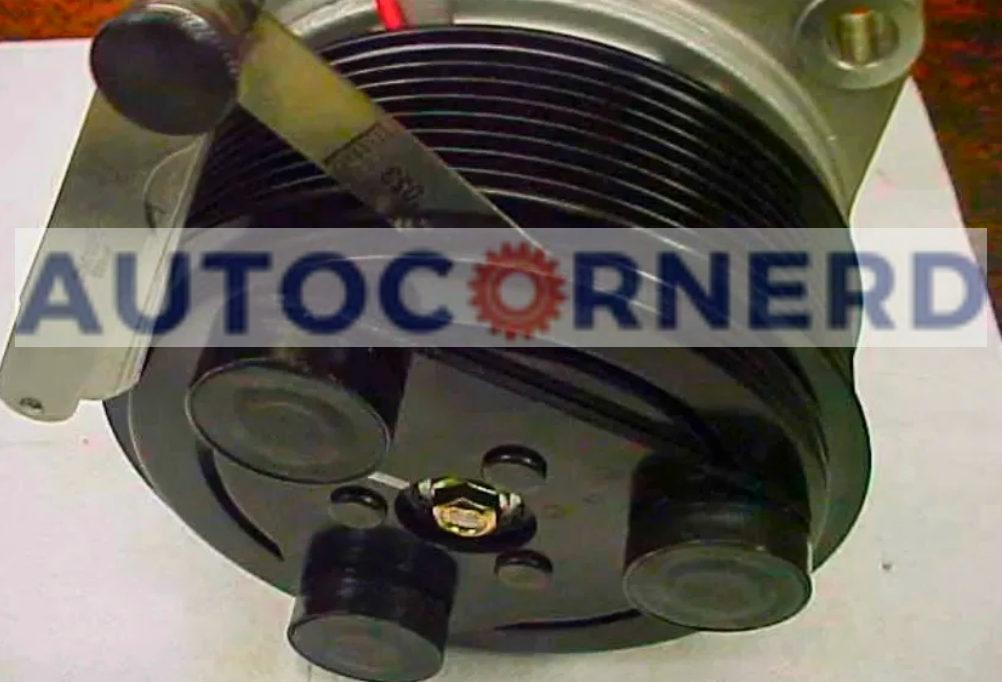
Inside the AC clutch you’ll see a small shim disc. The shim sets the gap size. You can adjust the gap by using a different thickness of shim.
6. Bad Electrical Connection Of AC Clutch Coil
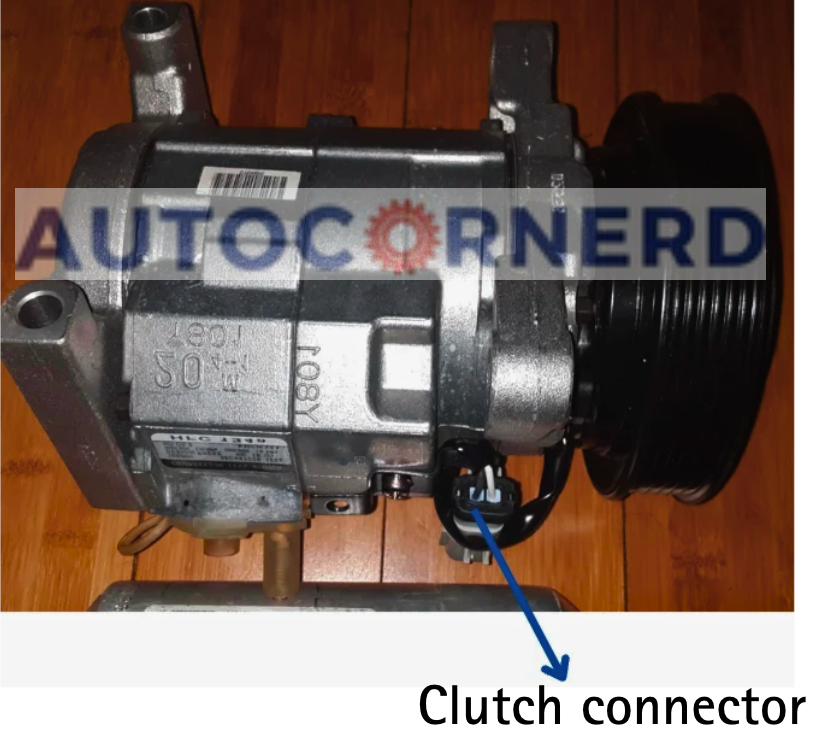
AC clutch coil uses 12v current from the battery to get magnetized and pull clutch plate towards the magnetic pulley.
In electrical connection, there can by intermittent electrical faults due to damaged insulation, exposure of wire and connector to the moisture, and loose connections due to damaged harness connector. So, due to these intermittent faults, AC compressure starts cycling after 3 to 4 seconds.
How to test?
To test for a short-to-ground compressor coil circuit, set a digital multimeter to the ohms scale and touch one lead to a clutch coil terminal and the other to a ground point on the compressor.
If there is a short circuit, you will not see any conductance. Similarly, perform the test for the other terminal of the coil.
After that, check the resistance across the terminals of the compressor clutch coil. If the resistance is less than 3 ohms or more than 5 ohms, it means the clutch coil is bad.
Does Throttle Body Affect AC?
The throttle body controls how much air goes into the engine. More air and fuel makes more engine power.
If the throttle body does not work right, the engine runs rough. A rough running engine makes the air conditioner work harder. This can make the air conditioner cool things less.
So the throttle body does not directly affect the car’s air conditioning. But an engine that runs badly because of a bad throttle body can make the air conditioner lose cooling power.
Types Of A/C Systems in a Car
In a car, there are two types of A/C systems:
- Expansion Valve with Receiver/Drier
- Fixed Orifice Tube with Accumulator
Both A/C systems have a compressor, condenser and evaporator. Both the orifice tube and expansion valve are placed between the condenser and evaporator.
Both orifice and expansion valve cause pressure and a temperature drop of the refrigerant, but the expansion valve also controls the refrigerant flow as it has a spring that controls the opening of the valve.
On the other hand, the orifice tube has a fixed opening. It does not vary the amount of refrigerant flowing into the evaporator the way an expansion valve can. So, in A/C systems with orifice tube, the compressor is on and off (AC clutch engages and disengages) at appropriate times to control the refrigerant flow.

In A/C systems with an expansion valve, a drier is used between the condenser and the expansion valve to capture dirt, rust, or any foreign particles. The drier has also a desiccant to protect the system by removing harmful moisture from the refrigerant.
In the orifice tube system, there is no drier. Instead, the orifice tube is responsible for filtering out the impurities and debris from refrigerant when it comes through its screen. In orifice tube systems, you will find an accumulator on the low-pressure line between the evaporator and compressor.
The function of an A/C accumulator is similar to the receiver/drier. But it is designed a bit differently and is typically much larger. The accumulator separates the liquid refrigerant from its vapors so that it does not harm the compressor. If any liquid enters the compressor, it will damage it.
Final Thoughts
In summary, low refrigerant can cause AC compressor short cycling. The refrigerant makes the AC cold. When it gets low, the compressor turns on and off trying to get cold.
Too much pressure in the AC system can also cause short cycling. Pressure switches sense the pressure. If the pressure gets too high, they shut off the compressor.
Faulty pressure switches can make the AC compressor short cycle. They may shut it off when they shouldn’t. Replacing them can fix this.
If the engine overheats, it can make the compressor short cycle. The hot engine heats up the AC system. This makes the compressor turn on and off.
A slipping clutch can also cause short cycling. The clutch connects the compressor to the engine. If it starts slipping, the compressor turns on and off.
To find the cause, you need to test the AC system. Check the refrigerant pressure with gauges. Do voltage tests on the electrical parts. Look for any leaks or damage.
To fix short cycling, refill the refrigerant if it’s low. Replace any faulty parts like pressure switches. Adjust the clutch if needed. Fix any engine issues causing overheating.
Regular maintenance helps prevent short cycling. It keeps the AC working right. But engine problems can still affect it. A rough-running engine gives less cooling even if the AC system is fine.
Some First Hand Experiences Shared By Users In Different Communities
Our team conducted research across various online communities, forums, and subreddits to gather user comments and opinions on “Short cycling of car ac compressor”.
User 1 says:
My Beetle started doing this out of nowhere. I’m not much of a car person, but a mechanic friend suggested checking the AC relay. Replaced it, and voila, the cycling stopped. It was a pretty easy and cheap fix.
User 2 says:
Noticed this weird cycling in my new Palisade. Took it to the dealership since it was under warranty. They found a defective pressure switch and replaced it. Haven’t had an issue since.
User 3 says:
I dealt with this in my Silverado. The issue was a combination of low refrigerant and a leaking hose. Recharged the system and replaced the hose. Problem solved!
User 4 says:
Had this exact issue last summer. My Outback’s AC compressor was cycling every 5 seconds. Turned out to be low refrigerant. A buddy helped me check the pressure, and it was way below normal. Refilled it and the problem was solved!
User 5 says:
I had this on my old Corolla. It was the AC clutch that was wearing out. Replacing the clutch was a bit of a hassle, but it did the trick. The AC has been working smoothly since.
How did you fix your issue of AC compressor short cycling? Please vote
[yop_poll id=”23″]
